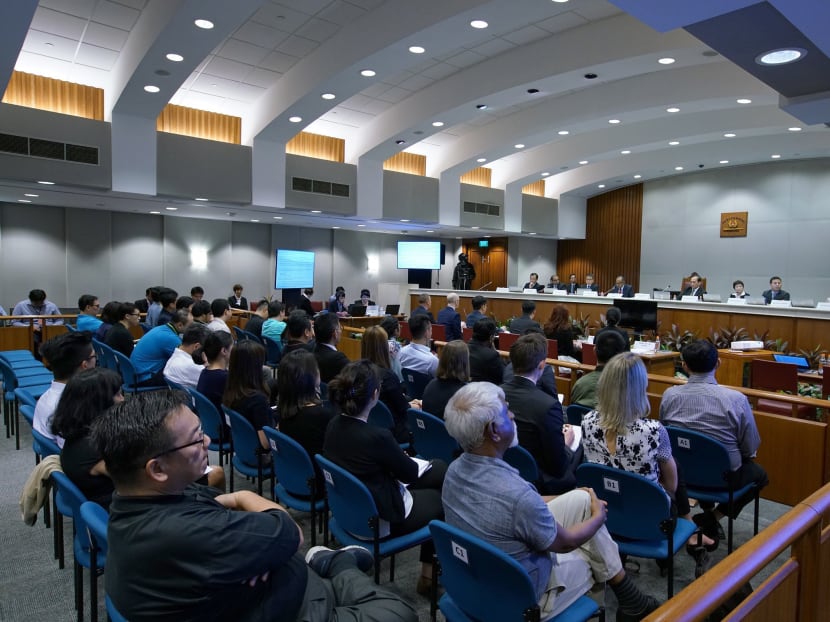Three issues to consider in drafting policies to tackle disinformation
After 170 written submissions, oral evidence from 65 individuals and organisations, and months of deliberation, the Parliamentary Select Committee on Deliberate Online Falsehoods has released its report on what is undoubtedly a shadowy long-haul threat to Singaporean society. Arguably, the report may best be assessed by seeing if its stated four desired outcomes can be arrived at via its 22 recommendations to Parliament.

The Parliamentary Select Committee on Deliberate Online Falsehoods at a public hearing in March 2018. Its report may best be assessed by seeing if its stated four desired outcomes can be arrived at via its 22 recommendations to Parliament, say the authors.
After 170 written submissions, oral evidence from 65 individuals and organisations, and months of deliberation, the Parliamentary Select Committee on Deliberate Online Falsehoods has released its report on what is undoubtedly a shadowy long-haul threat to Singaporean society.
How should the recommendations of the report be understood as well as assessed? Arguably, the report may best be assessed by seeing if its stated four desired outcomes can be arrived at via its 22 recommendations to Parliament.
By distilling the adjective laden desired outcomes of having a well-informed, digitally literate, respectful and tolerant society interacting in an ecosystem that is truth valuing and free from foreign influence, what is revealed is a clear desire to foster a society resilient to Deliberate Online Falsehoods (DOFs) while open to discussion.
Eschewing the belief that a government can go it alone through legislation to address the threat of DOFs, the recommendations adopt a whole-of-society approach by recognising that the public, news organisations, public institutions, legislation, and technology companies all have to paddle in the same direction in order to be effective.
For example, there are recommendations for concerned individuals, volunteers and NGOs to step up and help educate their communities, potentially reaching audiences not reached by Government-led public education.
Journalists, technology companies and institutes are covered as well, with recommendations to set professional standards of journalism, ensuring there is fairness, accuracy and integrity in reporting.
Technology platforms are also called on to take proactive action to prevent and minimise the amplification of online falsehoods on their platforms, and to demonstrate their accountability to their users, the public and the Government.
Finally, legislation may be deployed to nudge tech companies to cooperate as well as sanction perpetrators displaying a degree of criminal culpability in the dissemination of DOFs.
With no policy yet to give flesh to the recommendations, there is little to disagree with the committee’s recommendations.
Intuitively, they appear both sensible and measured ways to arrive at the stated desired outcomes. Regardless, to better arrive at the desired outcomes, three further issues may be considered as policies later take shape based on the recommendations.
The first issue relates to how journalism can play an effective role against DOFs.
While effective fact-checking, accurate reporting, and the upholding of professional standards and integrity will certainly serve the cause, one key aspect of quality journalism is absent from the committee’s report– the attending to questions readers may have of a news report.
The challenge for Singapore’s media will be to go beyond reporting facts. Instead, there is a need to anticipate and answer questions the public will have when presented with these facts before others with ill-intent fill the information vacuum with falsehoods.
Second, paradoxically, if the recommendations are followed through with highly successful policy, society must be wary of the mentality that ‘if it hasn’t been taken down, it must be okay’.
This mindset has been observed in the field of intellectual property enforcement, where customers assume a counterfeit product is genuine merely because it is available in public and no action has been taken against it.
The need for public vigilance is especially important as the threat of foreign disinformation campaigns is constantly evolving and will undoubtedly adapt to any legislation passed.
A state-sponsored organisation engaged in slow drip or long game tactics will find novel methods such as employing biased interpretation of facts in place of outright falsehoods.
They will also find new platforms where their messages can spread relatively undetected. They may even find ways to exploit legislation, such as the planting of multiple falsehoods with the specific intent of having them taken down in order to construct a conspiracy theory around the takedowns.
Third, following from the discussion above, the DOFs of greatest concern here are only one part of multi-faceted hostile influence operations.
These are national-level actions which can include foreign media and politicians, business organisations, 'armies' of online commentators (some human, some automated), and more. It is to an adversary’s advantage if it could raise doubts about the legitimacy of any legislation or how it is enforced, especially if there are perceived over-reactions.
Therefore, facing them strategically and not reactively while keeping the big picture in mind is key to success.
At the governmental level, a cross-cutting agency focusing on strategic communications could evaluate the possible responses, so that individual ministries can focus on operations.
This agency could in turn partner with civil society, NGOs, academia, media companies and technology platforms to provide a whole of society response that has the legitimacy to face this challenge.
In sum, the report is a good start in the right direction to address the ever-evolving, multi-faceted and amorphous threat DOFs pose for society.
Our responses will have to be re-examined and recalibrated regularly as adversaries employing disinformation will certainly adapt their tactics.
For our responses to have the greatest legitimacy and effectiveness, they must keep the desired outcomes in mind and involve the whole society.
ABOUT THE AUTHORS:
Benjamin Ang and Norman Vasu are Senior Fellows at the Centre of Excellence for National Security, S. Rajaratnam School of International Studies, Nanyang Technological University. They made written representations and provided oral evidence before the Select Committee in March 2018.






